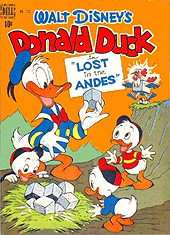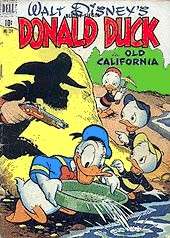

Once in an interview Barks was asked how he would like to be remembered by posterity. As storyteller, he replied without any hesitation. Although we all have had tremendous enjoyment from his brilliant drawings and the many characters he created, Barks never had doubts as to what his major skill was. And he was right of course, he had a God-given talent for storytelling that may never be surpassed.
He
rattled off brilliant ideas and well-thought out plots in a
steady flow (reaching an incredible total of approximately 1,000
finished manuscripts in all), and the well of inspiration never
dried out. Granted, there were some lesser stories but Barks was
consistently at a level where nobody could reach him.
His work can be read by all ages with equal enjoyment.
The child takes pleasure in the immediate entertainment,
while the adult will discover the psychological, the implied, and
the social-realistic aspects. Everybody has a marvellous time in
Barks' universe in their own way. And that is precisely the
storyteller's reward...
THE IDEAS
I just wanted it to be funny, Barks explained on several occasions. If the plot called for Donald to fall down, I'd sit and think of the funniest way I could have him fall down. Then I'd think of the funniest way I could have him get up.
This is really a precise
description of what it is to be a storyteller. Some people may be
able to churn out nifty stories but usually it is hard work. In
Barks' case it often happened that he started with the ending of
a story. He conceived an idea for a climax and then he would ask
himself how the characters got in that predicament. Then we
worked his way backwards.
In between he would sketch a little to have some graphic basics -
as he was taught in the storyboard days at Disney's - and because
it did not appeal to him to have the creation of the comic story
divided up strictly into two parts of writing and drawing. He
firmly felt that both were integrated parts of the same thing.
Sometimes Barks literally dreamt up his best ideas. This resulted in him keeping a pencil and pad on his bedside table. Many a night his wife Garé was awakened as he would suddenly sit up in bed to scribble down an idea.
But not every story came from
Barks' rich imagination. On occasion - about ten times I
believe, he once declared - he received part of a plot from
outside. A simple line might be sufficient for him to turn it
into a full story.
|
FC0256 Luck of
the North Barks once remembered actually buying the synopsis for a story in which Donald manufactures a bogus treasure map for Gladstone, luring him to Alaska, while Donald is left behind with growing remorse. FC0178
Christmas on Bear Mountain |
|
Barks simply invented his characters along the way. He was very
hesitant about mentioning issues not commonly known outside the
USA. For instance, he would not write a whole story based on
intimate knowledge of baseball as it would not - at least at the
time - be common knowledge to people in other countries. He would
not write about controversial issues either, i.e. certain
political points of view or social opinions, although his very
instructive story about Uncle Scrooge's money contained in an
open silo on his farm actually is a magnificent and easily
comprehensible description of market economics.
Though Barks never left the
continent in his comic book days he was able to describe his
ducks visiting far-away and exotic countries and he was very
accurate in portraying sceneries, characteristics, and
inhabitants.
This was done in various ways. He would question his
acquaintances when they returned from abroad, and he would look
up information in the dictionary named Encyclopaedia Britannica. Furthermore, he had from an early age subscribed
to the magazine National
Geographic through which he
would draw inspiration from pictures and background stories. If
a story called for a gold mine I simply looked up in the
Geographic and studied what they'd got on mining.
Most Barksists are aware of several merges between the magazine's
and Barks' pictures. This is especially distinctive in the early
The Mummy's Ring which takes place in Egypt. No doubt, that Barks
also strived for authenticity in his stories.
Another of Barks' strengths as a
storyteller was his vivid imagination regarding his characters'
names. He dreamt up precise and descriptive names as no one else
could. A few examples:
Miss Swansdown-Swoonsudden (WDCS067)
Pulpheart Clapperhead (WDCS092)
The Maharajah of Howduyustan (WDCS138)
Trestleman Truckhorse (WDCS188)
B. Swinely (WDCS271)
Yet another strong point was that Barks' manuscripts were sometimes inspired by a single word. If he one day sat down to write a ten-pager about Donald he only had to think up a profession he would like to tell about - and he was off. In this way, Donald has handled numerous professions through time. Quite impressive, really, as Donald never had training in anything at all.
THE NARRATION
Barks quickly realized that the ducks as they were known from the many animated shorts, would not stand a chance in his comics. The pace in a comic story had to be much more mellow and the stories had to carry considerably more weight. Thus he changed Donald from an annoying and brainless 'goose' to a multifaceted personality. He also transformed the nephews from naughty scamps into reflective and rational characters. Almost all of Barks' characters were given specific personalities which developed through the years.
Barks spent countless
hours polishing the scripts in a way that would bring the story
forward. The speech bubbles received the same attention. Some
times I even had to count the words to compress them to the
format of the bubbles. He quickly understood the folly in
letting the characters express what was already obvious from the
pictures, and this fact may be a contributing reason that his
stories moved along so smoothly.
The choice of words also was one of Barks' passions. I'll
rather use one word instead of four, he once stated, and
consequently he polished and re-polished his material into
perfection.
Normally being 6-8 months ahead of his deadlines, Barks was able to spend the necessary time to finish the material to his own satisfaction. He always worked on the best way to present a story and it usually poured out of him to an extent that his manuscripts from the start contained a lot more ideas and gags than could be compressed even into a 32-pager. No telling what we have missed during the years...
SCRIPT EXAMPLES
It is important to underline that this section in no way tries to criticize Barks' work. The two stories below are both exquisite and memorable. But they are also incredibly different despite their homogeneity. The mission is only to show Barks' versatility as a storyteller.
Taking two of the stories for a comparison will offer a excellent insight as to how Barks was able to change between means of expression. In 1954 he wrote U$07 'The Seven Cities of Cibola' and five years later he presented U$26 The Prize of Pizarro. Both stories are closely related in their choice of theme - the ducks are looking for gold from an old Spanish galleon - but they are very different in their construction.
'Cibola' is a forceful, solemn, archaeological and almost educational story which starts off with action in a most realistic way. Apart from one single frame in the beginning the story it is completely stripped from gags and the whole thing floats silently along. All the action that normally characterizes the long adventures is gone. This is not a real adventure. Not even the Beagle Boys contribute very much to the story. As a matter of fact they could be omitted. What would be a child's reaction to this kind of story?
'Pizarro' is quite a different story. It runs rapidly and in the very beginning Barks presents the plot when Scrooge finds an old treasure letter. The scene is set. The adventure can begin. The story is loaded with gags, for instance as Scrooge stubbornly only reads one sentence from the letter at a time resulting in various dangerous situations for the ducks along the way. As they are closing in on their goal, Barks turns to pure farce in the description of the traps the Indians erected 400 years earlier in an attempt to keep the tall Spaniards away. Moviemakers George Lucas and Steven Spielberg surely got lots of inspiration for their Indiana Jones movies from here.
THE FAVOURITE STORY
| In most interviews Barks was asked which of his many stories was his favourite. Barks always responded but with varying stories. |
 FC0223 Lost in the Andes |
 FC0328 In Old California |
 FC0408 The Golden Helmet |
It seems that the ten-pager he
recalled most frequently was the story in WDCS146
in which Donald worked as a chicken farmer (as was Barks briefly
in his early career) and everything turned out wrong to such an
extent that the unfortunate town in which the story takes place
was renamed Omelet. Barks would shudder when remembering the
numerous eggs that had to be drawn, though.
Among the long stories Barks often mentioned FC0408 The Golden
Helmet, U$65
Micro Ducks from Outer Space, FC0275 Ancient Persia, and FC0328 In Old California.
Especially the two latter might sound a bit surprising as they
were both set in a special, non-typical environment and In
Old California didn't even have very much action.
But the favourite was undoubtedly FC0223 Lost in the
Andes featuring the famous square eggs. It was written
in 1949 - which in Barks' own opinion marked the paramount of his
career - and he considered it the most technically perfect of his
stories. Apart from the inventive and adventurous story it is
strewn with direct and psychological gags, a few of them are even
running gags such as for the nephews' constant use of bubble gum.
THE CONCLUSION...!?
Don Rosa, who some may consider Barks' successor, named him 'The greatest Storyteller of the 20th Century'. Don Rosa may be a bit prejudiced but perhaps he could be right, eh?
| http://www.cbarks.dk/THESTORIES.htm | Date 2002-02-02 |